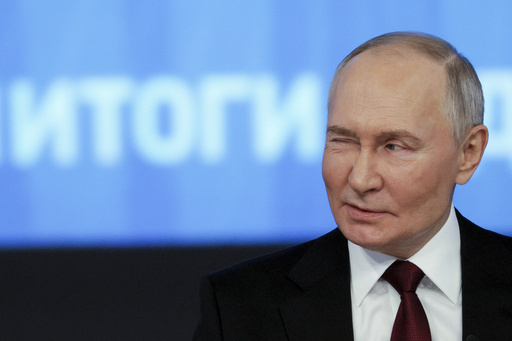
MOSCOW — In his annual news conference held on Thursday, President Vladimir Putin claimed that the military actions that Russia has taken in Ukraine have fortified the nation, refuting the notion that the removal of key ally Bashar Assad in Syria has diminished Moscow’s international standing. The organized event spanned approximately four and a half hours and served to reaffirm his authority while showcasing his comprehensive knowledge of various topics, from inflation rates to military advancements.
Putin asserted that the decision to deploy troops to Ukraine in 2022 has enhanced both Russia’s military and economic clout. He expressed a desire that the decision had come earlier, allowing for better preparation. “Over the last two to three years, Russia has emerged as a notably stronger nation, becoming a true sovereign state,” he remarked. He emphasized Russia’s economic resilience, asserting that the nation’s military strength is currently the most formidable globally.
Having held a leadership position for nearly 25 years and starting a new six-year term this year, Putin stated that the military is making progress in reaching its objectives within what he designates as a special military operation in Ukraine. Addressing inquiries regarding a new hypersonic ballistic missile recently utilized against Ukraine, he dismissed assertions from some Western analysts who claimed NATO’s air defense systems could intercept it.
With a tone of mockery, he issued a challenge to Ukraine’s supporters, suggesting a “high-tech duel” where Russia would notify them of an impending strike on Kyiv and test the effectiveness of the West’s air defense systems. “Let them choose a target in Kyiv, deploy their air defense systems there, and we will launch an attack with the Oreshnik missile,” he noted, offering a sarcastic smile. “Let’s see the outcome.” Ukrainian President Volodymyr Zelenskyy, in a response during his trip to Brussels, questioned the rationality of Putin’s remarks.
Despite some slow but steady progress in Ukraine, Russia has faced notable setbacks. Recently, the assassination of Lt. Gen. Igor Kirillov in Moscow, attributed to Ukraine, raised concerns about the effectiveness of Russia’s security agencies. Putin labeled the incident a significant error by these agencies and urged them to rectify their shortcomings.
Additionally, Russian forces are engaged in combat with Ukrainian troops in the Kursk region. When questioned about the timeline for expelling Ukrainian forces from the area, Putin stated, “We will definitely drive them out,” without specifying a timeframe.
In a familiar display of pageantry during the lengthy press event, Putin invited attendees to unveil a banner sent to him by marines involved in the operations in Kursk while he spoke about Ukraine.
Putin also indicated a willingness to engage in dialogue with U.S. President-elect Donald Trump, who has expressed intentions to negotiate peace concerning the ongoing conflict in Ukraine. “If we meet, there will indeed be topics to discuss,” he commented, without delving into specifics. He reiterated that Russia is open to negotiations for a resolution in Ukraine, emphasizing the need for concessions and that discussions should reflect “the situation on the ground.”
Previously, Putin has insisted on conditions such as Ukraine’s abandonment of its aspirations to join NATO and acknowledgment of Russia’s territorial acquisitions, demands which have been dismissed by Kyiv and its Western allies.
On the topic of Assad’s regime, Putin noted that he has yet to meet with the former Syrian leader, currently in asylum in Moscow, but intends to inquire about the case of Austin Tice, an American journalist who disappeared in Syria over a decade ago. He also acknowledged the importance of establishing connections with groups that have replaced Assad to maintain the safety of Russia’s personnel in Syria and prolong its military presence there.
Putin maintained that contrary to perceptions, the outcomes in Syria have not weakened Russia. He contended the military campaign launched in support of Assad back in 2015 has successfully targeted “terrorist” factions, claiming that shifting dynamics among opposition groups could lead to improved relations with the West. Furthermore, he termed Israel as the primary beneficiary of the situation following Assad’s downfall, expressing a desire for the eventual disengagement of Israeli forces from southern Syria.
When asked about U.S. President Joe Biden’s choice to pardon Hunter Biden amid multiple felony charges, Putin opted not to criticize the American leader. He explained that political decisions often require weighing political implications against humane considerations, suggesting that Biden had chosen the more compassionate route in this instance.
In keeping with past events, the live news conference was dominated by domestic matters, as journalists and citizens raised concerns regarding rising consumer prices, insufficient pensions, and inadequate healthcare. Initial reports indicated that over 2 million questions had been submitted by the public ahead of the event. Putin commenced the session by stating that the economy is on track to see a growth rate of nearly 4% this year, acknowledging current inflation levels of 9.3% while asserting that the economic landscape remains stable.
The overall atmosphere of the event was part news conference, part spectacle, as reporters waved colorful placards in an effort to draw Putin’s attention to specific local issues.
